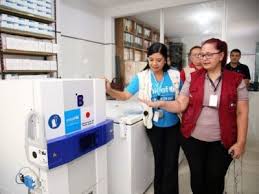Cold Chain Knowledge and Training Course
Cold Chain Knowledge and Training Course is a comprehensive program designed to equip professionals with essential skills, industry insights, and practical strategies for managing temperature-sensitive supply chains.
Skills Covered

Course Overview
Cold Chain Knowledge and Training
Introduction
Cold Chain Knowledge and Training Course is a comprehensive program designed to equip professionals with essential skills, industry insights, and practical strategies for managing temperature-sensitive supply chains. In today's global economy, cold chain logistics plays a critical role in preserving the integrity of pharmaceuticals, perishable food, and biologics across transportation and storage. This course combines theoretical knowledge with real-world case studies to ensure learners gain operational, regulatory, and technical competence.
With increasing emphasis on sustainability, vaccine logistics, and digital cold chain monitoring, this course prepares professionals to meet evolving global demands. Participants will explore cutting-edge technologies such as IoT-enabled sensors, blockchain for traceability, and AI in predictive temperature monitoring. Designed for logisticians, health professionals, manufacturers, and supply chain managers, this training empowers learners to design, manage, and optimize robust cold chain systems that prevent product degradation and meet international compliance standards.
Course Objectives
By the end of this course, participants will be able to:
- Understand the fundamentals of cold chain logistics and its importance in global supply chains.
- Analyze temperature-sensitive product handling requirements and risk mitigation strategies.
- Apply good distribution practices (GDP) and regulatory guidelines in cold chain operations.
- Implement temperature data monitoring systems using IoT and remote sensors.
- Evaluate the use of blockchain for cold chain transparency and traceability.
- Design an efficient last-mile cold chain delivery strategy.
- Integrate AI and machine learning in cold chain predictive analytics.
- Manage vaccine and biologics cold chain logistics.
- Ensure energy-efficient refrigeration technologies and sustainable practices.
- Develop emergency response plans for cold chain disruption recovery.
- Audit and assess cold chain compliance and quality assurance standards.
- Identify packaging solutions for cold chain temperature insulation.
- Leverage digital tools for cold chain training and workforce development.
Target Audience
- Pharmaceutical Logistics Managers
- Healthcare and Public Health Professionals
- Cold Chain Equipment Technicians
- Warehouse and Storage Facility Managers
- Supply Chain and Logistics Consultants
- Food and Beverage Quality Assurance Officers
- Government Regulatory Officers
- Vaccine Program Coordinators
Course Duration: 5 days
Course Modules
Module 1: Introduction to Cold Chain Logistics
- Definition and Scope of Cold Chain Systems
- Importance in Pharmaceuticals and Perishables
- Categories of Temperature-Sensitive Products
- Cold Chain Failures and Their Consequences
- Global Trends in Cold Chain Logistics
- Case Study: Cold Chain Breach in Vaccine Delivery in Nigeria
Module 2: Temperature Monitoring Technologies
- Data Loggers and Real-Time Monitoring
- IoT Devices in Cold Chain
- Cloud-Based Tracking Systems
- Alerts and Notifications in Temperature Deviations
- Integration of Monitoring with Logistics Platforms
- Case Study: IoT Use in Cold Chain by DHL
Module 3: Regulatory Framework and GDP Compliance
- WHO Guidelines on Good Distribution Practices
- National and International Regulatory Bodies
- Documentation and Record-Keeping Standards
- Audits and Inspection Procedures
- Certification and Training for Compliance
- Case Study: GDP Audit of a Vaccine Storage Facility
Module 4: Packaging and Insulation Methods
- Types of Cold Chain Packaging
- Phase Change Materials and Gel Packs
- Vacuum Insulation Panels (VIP)
- Duration and Temperature Thresholds
- Packaging Selection Based on Route and Duration
- Case Study: Ice-Pack Packaging in Polio Campaigns
Module 5: Cold Storage and Transportation
- Cold Storage Types and Maintenance
- Refrigerated Trucks and Containers
- Air and Sea Transport for Cold Chain
- Route Planning and Risk Analysis
- Cold Chain Infrastructure in Low-Income Countries
- Case Study: Frozen Fish Export Supply Chain from Kenya
Module 6: Emergency Preparedness and Risk Mitigation
- Backup Power and Equipment Redundancy
- Contingency Planning for System Failures
- Crisis Communication Protocols
- Recovery and Restoration Procedures
- Insurance and Risk Transfer Strategies
- Case Study: Cold Chain Recovery Plan in Cyclone-Hit Mozambique
Module 7: Digital Cold Chain Management
- Software Platforms and Dashboards
- AI and Predictive Analytics
- Blockchain Integration
- Data Visualization and Reporting
- Staff Training and Digital Literacy
- Case Study: Blockchain Cold Chain by IBM & Walmart
Module 8: Cold Chain for Vaccines and Biologics
- Vaccine-Specific Temperature Ranges
- Multi-Dose Vial Policies
- Cold Chain Challenges in Rural Areas
- Partnerships with Global Health Organizations
- Mobile Cold Storage Innovations
- Case Study: COVAX Cold Chain Logistics
Training Methodology
- Interactive Instructor-Led Sessions
- Real-World Case Studies and Group Discussions
- Hands-On Demonstrations of Monitoring Tools
- Simulation Exercises for Risk Management
- Quizzes and Knowledge Checks after Each Module
- Capstone Project on Cold Chain Process Design
Register as a group from 3 participants for a Discount
Send us an email: info@datastatresearch.org or call +254724527104
Certification
Upon successful completion of this training, participants will be issued with a globally- recognized certificate.
Tailor-Made Course
We also offer tailor-made courses based on your needs.
Key Notes
a. The participant must be conversant with English.
b. Upon completion of training the participant will be issued with an Authorized Training Certificate
c. Course duration is flexible and the contents can be modified to fit any number of days.
d. The course fee includes facilitation training materials, 2 coffee breaks, buffet lunch and A Certificate upon successful completion of Training.
e. One-year post-training support Consultation and Coaching provided after the course.
f. Payment should be done at least a week before commence of the training, to DATASTAT CONSULTANCY LTD account, as indicated in the invoice so as to enable us prepare better for you.